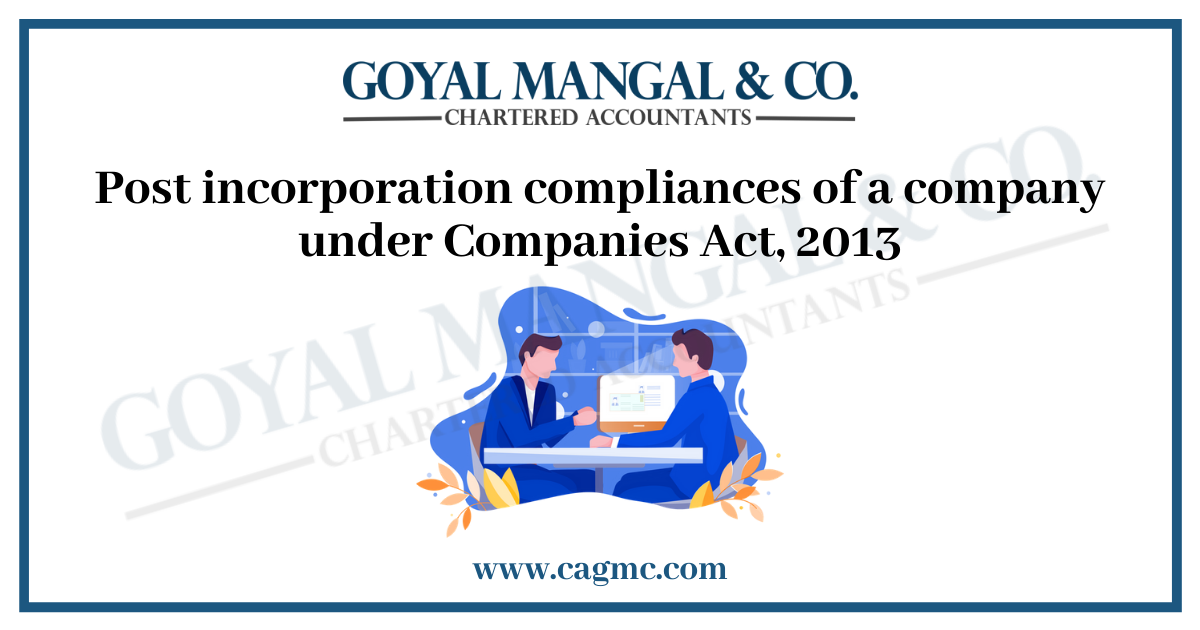| Table of Content |
Introduction
Simply incorporating a company and starting a business is not sufficient. Obtaining an incorporation certificate is just the beginning of the business. There are various compliances that are to be met with the post-incorporation of the company. There are yearly as well as quarterly compliances.
The governing law lays down the series of compliances to be followed by a private limited company post its incorporation, and is set forth under the Companies Act of 2013 and its accompanying rules.
Types of Compliances for Companies under Companies Act, 2013
Compliances for companies can be categorized in following types:
- Post incorporation compliances
- Annual compliances
This article discusses the compliances which are to be followed by a company after its incorporation.
Advantages of Post Incorporation compliances of a Company
- Protects against penalties and fines
- Enhances market standing
- Increases credibility
- Increases transparency in working
- Helps in expansion of business
- Saves time and money
- Brings efficiency in decision making process.
In case of non – compliance:
If you do not adhere to the requirements of Post incorporation compliances, you will:
- Attract penalties and fines
- Not easy availability of credit
- Unsatisfied shareholders
- Restricts the scope of business
- Hampers proper functioning

Mandatory post incorporation compliances under Companies Act, 2013
- Filing form for verification of Registered office- After successful incorporation every company is required to complete verification of its registered office with the registrar of companies. They have an option to communicate the same via SPICe Form at the time of incorporation. However, if that is not done, then it must be communicated through INC-22 within 30 days of incorporation.
- Open a bank account of the company- After incorporation of a company, it is required to open its current account through which all the transaction shall take place for which following documents required are
-
- PAN Card of Company
- Board Resolution for opening and operating company’s bank account.
- KYC of Directors
- Deposit the share capital money into Bank Account- The company is required to receive the money from its subscribers of memorandum and get the same deposited in the bank account within a period of 60 days of its incorporation. Once the money is deposited in the Bank Account the Company is required to file a declaration in E-form INC 20 A. Irrespective of whether the amount has been deposited or not, a share certificate is required to be given.
Note: Companies incorporated after 2nd November, 2018 can deposited within 180 days from the date of incorporation are required to file the declaration by the director with the Registrar of Companies stating that every subscriber to the memorandum has paid the value of shares taken by them.
- Issue of Share certificates to the shareholders-A share certificate act as an evidence of the number of shares held by an individual in the company. This certificate shall be issued in the prescribed form i.e. SH-10. Also it must be properly stamped as per the state laws. Such certificate should be issued within a period of 60 days from the date of its incorporation. Any delay in its issue is liable for penalty of ₹25000 to ₹500000 in case of a company and of ₹10000 to ₹100000 in case of individual director.
- Appointment of First auditors by the company- Within 30 days of registration of the company, it is required to appoint it’s first auditor who shall be a Chartered Accountant which can be appointed by the Board of Directors who shall remain till the conclusion of 1st Annual General Meeting. Further, the Board of Directors can recommend the appoint as the Statutory Auditor to hold office from the conclusion of first Annual General Meeting to conclusion of 6th Annual General MeetingFor appointment e-form ADT is required to be filed within 30 days of appointment though filing of ADT-1 is not mandatory in case of appointment of 1st Auditor.
- Disclosure of interest by Directors-Every director of the company in its first board meeting shall disclose his/her interest. Disclosure of his concern, interest, and shareholding in any company, firm or association of individuals shall be made in form MBP-1 by every director. This disclosure is important as it helps to increase transparency and to avoid related party transactions.
- GST Registration- If your business annual turnover exceeds Rs. 40lacs and supply of services is more than ₹20lacs then it is mandatory for you to have GST Registration for your establishment. Anyone supplying good or services to another state need to apply for GST regardless of turnover.
- Maintenance of Company’s Minute Book and other statutory books- The company is required to maintain various statutory registers like register of members, register of shareholders, register of directors etc. In addition to it, the company also maintains minute book of the general meeting and board meeting conducted by it. Each book is required to be maintained in double entry system on accrual basis. These books should give a true and fair view of the state of affairs of the company. Company can maintain e-statutory books rather than in physical form.
Annual Compliances under Companies Act, 2013
Now that we have covered all the after incorporation compliances under Companies Act, 2013, lets discuss about the compliances under Companies Act, 2013 that are required to be completed on yearly basis. Following is a list of all such yearly compliances under Companies Act, 2013:
- Meeting of board of Directors – As per section 173 of companies Act 2013 every company is required to conduct a meeting of it’s board of Directors within 30 days of it’s incorporation. Further there is a need to conduct atleast 4 board meeting in a year with a maximum gap of 120 days* between two consecutive board meeting. However, in case of dormant companies and one-person company at least one meeting shall take place in each half of the calendar year and gap between two meetings shall not be less than 90 days. ⅓ of total number of directors or 2 directors whichever is higher should be present at the meeting.Further in view of the difficulties faced due to the rise of COVID-19 and other request received from the stakeholders the requirement of holding the Board Meeting stands extended by 60 days and consequently the gap between two board meetings may extend to 180 days during the quarter April to June 2021 and July to September 2021.
- Annual General Meeting- The First Annual General Meeting should be held within 9 months from the end financial year, hence it shall not be necessary to hold AGM in the year of incorporation. Further, subsequent Annual General Meeting should be held within 6 months from the end of financial year and that the gap between two AGM should not be more than 15 months AGM should be held once every year.
- Filing of Annual Return to ROC- It is an annual event which contains details about tax paid, returns received, deduction claimed if any. Such return should be filed to respective Registrar of Companies with the help of MCA portal (www.mca.gov.in) Non-filing may result into fines, penalties and scrutiny by the Income Tax department. It has to be filed even when the company doesn’t make any profit. Company having paid up share capital of ₹10crore or more or turnover of ₹50 crores or more shall be certified by CS in practice and the certificate shall be in Form No. MGT-8.
Now the Company is required to file the Balance Sheet along with the statement of P/L account and Cash Flow (if applicable), Directors Report along with other papers which were approved by the Members in the Annual General Meeting in the following forms within the time specified: – - E-Form ADT -1 (Appointment of Auditor): For appointment of Auditor within 15 days from Annual General Meeting
- E-Form AOC-4 (Filing of Financial Statements)–within 30 days of holding its Annual General Meeting. The applicability of type of AOC-4 varies i.e. if having a subsidiary then AOC-4 CFS is to be filed etc.
- E-Form MGT-7(Annual return)-to be filed within 60 days from the date of Annual General Meeting stating the list of Members as on close of the Financial Year along with the list of share transfer list of Members along with other information.
Conclusion
For any company incorporated in India, it is important to consider the compliances discussed in this article as per Companies Act, 2013. The compliances might seem to be tedious and repetitive process, however, such compliances under Companies Act, 2013 is an ongoing process and not a onetime thing.


